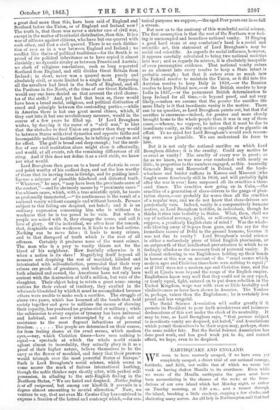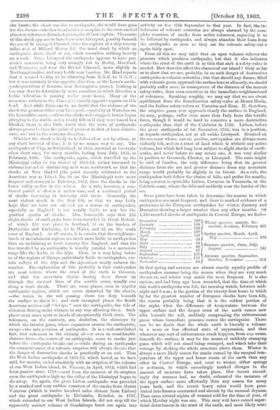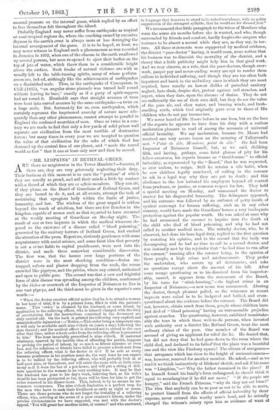EARTHQUAKE AND ENGLAND.
E seem to have narrowly escaped, if we have even yet completely escaped, a direct trial of our national courage, fortitude, and faith, not unlike that of which we wrote last week as having shaken Manilla to its overthrow. Even while we wrote of the Manilla earthquake the gases must have been accumulating in the chasms of the rocks at the foun- dations of our own island which last Monday night, or rather on Tuesday morning, at 3.20 a.m., sent a tremor through the island, breaking a little crockery, stopping a few clocks, and shattering many nerves. An old lady in Northampton said that had
she known the shook was due to earthquake, she would have gone for the doctor—whether to administer morphia to the over-excited
planet or toher own disturbed system, she did not explain. The centre of this shock appears to have been near Liverpool, possibly beneath the sea of St. George's Channel, since the captain of a ship twenty miles west of Milford Haveo felt the usual shock by which an earthquake shows itself at sea, which resemblas striking heavily on a rock. From Liverpool the earthquake appears to have pro- ceeded eastwards, being very strongly felt in Derby, Hereford, and Worcester, and near the Bristol Channel, more slightly in Northamptonshire., mil very feebly near London. Mr. Hind reports that it seemed -to him to be vibrating from E.N.E. to W.S. W. ; but it was certainly in the opposite direction, as Mr. Lowe's earth- quake pendulum at Beeston, near Nottingham, proved. Nothing is less easy than to determine by mere sensation in which direction a feeble vibration is passing under your house. Many of the numerous writers to the Times give exactly opposite reports on this head. Aril while there can be no doubt that the violence of the shock was greatest either near Liverpool, —probably at Waterloo. on the Lancashire coast, —where the clocks were stopped, horses began plunging in the stable, and a family felt as if they were tossed in a blanket, there is else little doubt that the wave of earthquake always proceeli from the point of greatest to that of least disturb- ance, an 1 not in the contrary direction.
Whether the shock is likely to be followed or not by others, at any short interval of time, it is by no means easy to say. The earthquake of Visp, inSwitzerland, in 1855, recurred at intervals, often short ones, for many months, lasting from July, 1855, to February, 1856. The earthquake, again, which travelled up the Mississippi valley in the winter of 1811-12, rather increased iu violence instead of diminishing as it went northward, so that the shocks at New Madrid (the point recently celebrated in the American war as Island No. 10 on the Mississippi) were more frequent and stronger in February, 1812, than the shocks in the lower valley earlier in the winter. A3 a rule, however, a con- tinued period of shocks is rather rare, and a continued period of shocks increasing in intensity still rarer. Generally, the most violent shock is the first felt, so that we may fairly hope that we have not entered on a season of earthquakes, especially as Englan I is not usually liable to any but the gentlest species of shocks. Mrs. Somerville says that 255 slight shocks of earthquake have been recorded in Great Britain, of which 139 too': place in Scotland, 14 on the borders of Derbyshire and Yorkshire, 30 in Wales, and 31 on the south coast of Englan 1. At all eveats, it is certain that the neighbour- hoods of mountainous regions are much more liable to earthquakes than an undulating or level country like England, and that the line travellel by an earthquake is usually parallel to a mountain range like the Andes or the Alps. Thus, in a map lying before us of the regiona of Europe particularly liable to earthquakes, cer- tain valleys of the Alps and the Apennines nearly exhaust the number. The explanation of this probably is that earthquakes are most serious where the crust of the earth is thinnest, and that the mountain chains having been thrust up through the weakest lines of the earth's crust, usually run along a weak streak. There are some places, even in replier earthquake regions, which are never disturbed by the shocks, —the waves in the soil passing there too deep beneath the surface to shake it ; and such exempted places the South American natives call " brillyee " over the earthquake, the tide of vibration flowing under without in any way affecting them. Such places must mark spots or bands of exceptionally thick crust. The volcanoes, on the contrary, are. doubtless, the chimneys by which the interior gases, whose expansion creates the earthquake, escape—the safety-valves of earthquake. It is a well-established fact, that volcanoes in the vicinity of—or even at considerable distance from—the centre of an earthquake, cease to smoke just before the earthquake breaks out ;—while during an earthquake the commencement of a volcanic eruption will always denote that the danger of destructive shocks is practically at an end. Thus the West Indian earthquake of 1811-12, which lasted, as we have said, for months, ended absolutely with an eruption of the volcano of one West Indian island, St. Vincent, in April, 1812, which had been passive since 1718 ;---and from the moment of its eruption even the earthquakes high up the valley of the Mississippi began to die away. So, again, the great Lisbon earthquake was preceded by a marked and very sudden cessation of the smoke from Mount Vesuvius (which is twelve hundred miles distant from Lisbon) and the great earthquake in Riobamba, Ecuador, in 1797, which extended to our West Indian Islands, did not stop till the apparently extinct volcano of Guadeloupe burst out again into
activity on the 17th September in that year. In fact, the in- habitants of volcanic countries are always alarmed by the com- plete cessation of smoke from active volcanoes, expecting it to be followed by earthquake, and always abandon their fears from the earthquake so soon as they see the volcanic safety-valve again fairly open.
From all this we may infer that an open volcano relieves the pressure which produces earthquake, but that it also indicates where the crust of the earth is so thin that such a safety-valve is needed. How does this affect the chances of our island ? Only so far as to show that we are, probably, iu no such danger of destructive earthquake as volcanic countries; but that should any fissure, filled with volcanic gases, approach the surface here at all nearly, we should probably suffer more, in consequence of the distance of the nearest safety-valve, than even countries in the immediate neighbourhood of volcanoes. Speaking roughly, we may say that we are about equidistant from the Scandinavian safety-valve at Mount heels, and the Italian safety-valves at Vesuvius and Etna. If, therefore, the eruptive gases ever approach closely the surface in England, we may, perhaps, suffer even more than Italy from this terrific force, though it would be hard to conceive a more destructive earthquake than that of the Calabrias in 1783. Lisbon, before the great earthquake of 1st November, 1755, was in a position, as regards earthquakes, not at all unlike Liverpool. Situated on the sea coast where, cote is paribus, earthquakes are always more violently felt, and on a tract of land which is without any active volcano, but which had long been subject to slight shocks of earth- quake, and never before to any severe one, it was very similar in position to Greenock, Chester, or Liverpool. The same might be said of London, the only difference being that its greater distance from the sea and greater distance from any mountain range would probably be slightly in its favour. As a rule, the earthquakes both follow the chains of hills, and prefer the seaside, being severest in spots like Lisbon, Caraccas in Venezuela, or the Calabria coast, where the hills end suddenly near the border of the sea.
Some pains have been taken to determine the seasons in which earthquakes are most frequent, and there is marked evidence of a preference in the European earthquakes for winter, January and December showing a larger number than any other months. Of 1,230 recorded shocks of earthquake in Central Europe, we find— So that spring and autumn are almost exactly equally prolific of earthquakes, summer being the season when they are very much the rarest, and winter very much the most frequent. It is also curious, and had long ago been recorded, that the time at which this week's earthquake was felt, the morning watch, between mid- night and 6 a.m., is the portion, of the twenty-four hours in which by far the greatest number of European shocks have been felt, the reason probably being that it is the coldest portion of the night, when the difference of temperature between the upper surface and the deeper crust of the earth causes• new rifts beneath the soil, suddenly compressing the subterranean gases whose immediate pressure causes the earthquake. There can be no doubt that the whole earth is literally a volcano in a more or less effectual state of suppression, and that whenever any sort of subterranean crack happens, from any cause, beneath the surface, it may be the means of suddenly cramping gases which will not stand being cramped, and which take their revenge by shaking the whole structure above them. Winter is always a more likely season for cracks caused by the unequal tem- perature of the upper and lower strata of the earth than any other in Central Europe, and, next to winter, either springs or autumns, in which exceedingly marked changes in the amount of moisture have taken place. Our recent exceed- ingly dry summer had, no doubt, exhausted the moisture of the upper surface more effectually than any season for many years back, and the recent heavy rains would have pene- trated into fissures contracted and shrunk by the unusual dryness. Then came several nights of unusual cold for the time of year, of which Monday night was one. This may well have caused super- ficial disturbances in the crust of the earth, and most likely some December January February
March April May Juno July August September October November . 168 150 Winter quarter, namely, De- 143 comber, January, February 461
119t3 Spring quarter, March, April,
May 315 58
54 Summer quarter, June, July, 40
August 141 47 • •
117 Autumn quarter, September,
111 85 October, November 313 unusual pressure on the internal gases, which replied by an effort to free themselves felt throughout the island.
Probably England may never suffer from earthquake as tropical or semi-tropical regions do, where the cracking caused by excessive dryness in the earth's crust is always more or less deranging the internal arrangement of the gases. It is to be hoped, at least, we may never witness in England such a phenomenon as was recorded in Jamaica in 1692, when one of the chasms in the earth swallowed up several persons, but soon re-opened to eject their bodies on the top of jets of water, which threw them to a considerable height above the surface. Such freaks of natural violence are with us usually left to the table-turning spirits, many of whose perform nieces are, indeed, strikingly like the achievements of earthquakes on a diminished scale. Thus, in the earthquake of Concepcion, in Chili (1835), "an angular stone pinnacle was turned half round without leaving its base," exactly as if a party of spirit-rappers had sat round it. Humboldt says that straight avenues of trees were bent into curved avenues by the same earthquake—a twist on a huge scale. But, fortunately for us, even earthquakes, which certainly represent the imprisoned anarchy of nature more ade- quately than any other phenomenon, cannot attempt to parallel in England the confessed anarchies of man. Once or twice in a cen- tury we are made to feel that only a few yards of solid prison wall separate our civilization from the most terrible of destructive forces ; but many times in every year we are tempted to question the value of that civilization for the sake of which God has .dammed up the central fires of our planet, and " made the round world so fast " that it can at least only now and then be moved.
































 Previous page
Previous page